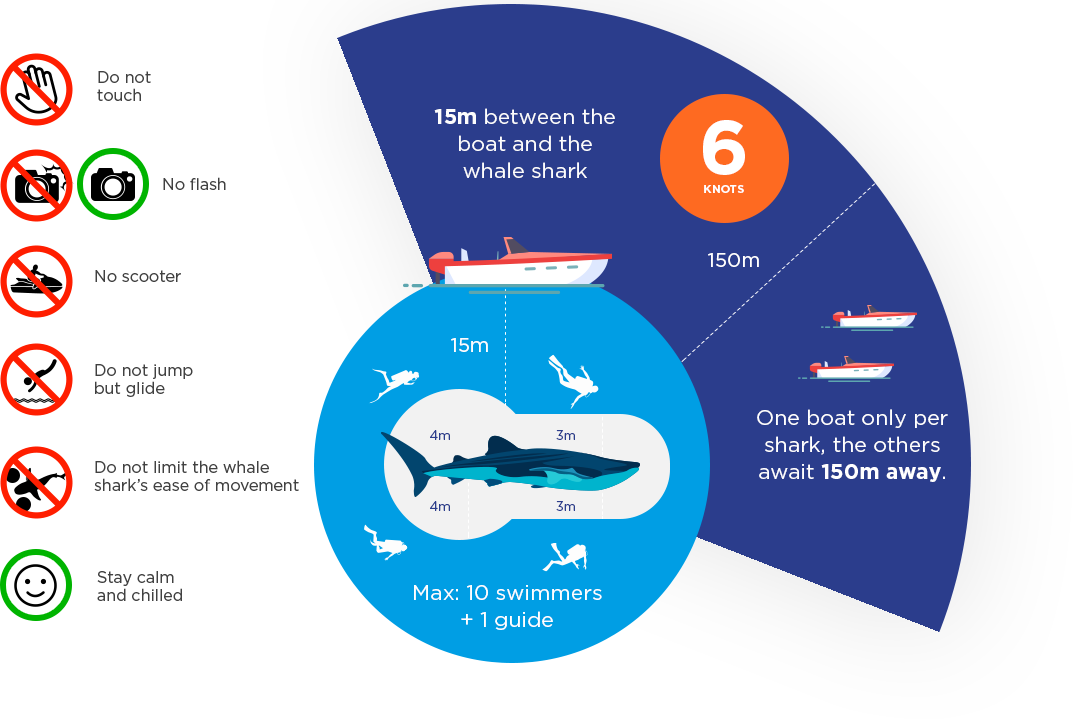Code of conduct
Regulating whale shark interactions
Why a code of conduct?
Significant risks for both humans and sharks
Motor boats in the water use propellor engines, threatening marine wildlife when they are in use. As a result, animals such as whale sharks, as well as swimmers; are prone to substantial injury, and possible death, if they come in contact with the propellor.
Sadly, across the world whale sharks, as well as dolphins and whales, show clear scars resulting from interactions with boat propellors. Actually, 40% of identified whale sharks in Nosy Be show scars that are likely due to boat propellors. Dead whale sharks, unlike cetaceans, will not float at the surface so it remains difficult to estimate the impact of boat propellor scars on whale shark longevity.
Having a code of conduct in place works to minimise any possible impacts of tourism on whale sharks while also improving client satisfaction.
Adopting the code of conduct greatly facilitates interactions between humans and whale sharks. It provides clients with a life-changing experience, and sustains a friendly atmosphere between operators, while respecting whale shark behaviour and allowing them to feed ; even if it means waiting little longer.
Let’s work together to protect the whale sharks of Madagascar! We have teamed up to create Swim with Whale Sharks, an online ressource providing information and videos to facilitate the use of the code of conduct by guides and clients alike.
Win-win benefits
Positive interactions for everyone
Juvenile whale sharks come to Nosy Be to feed at a crucial time in their life, yet this natural behaviour is often interrupted by boats and swimmers. In order to investigate the impact of boats and swimmers on whale sharks, Pierce et al. 2010 studied avoidance behaviours, such as banking (when the shark shows its back to the swimmer in a defence mechanism), which were shown to be correlated with the number of boats around at the time of the encounter. More boats meant a higher incidence of avoidance behaviours. On the flip side, these avoidance behaviours were less frequent when there were fewer boats around and when swimmers were relaxed.
Thanks to the code of conduct, customer satisfaction is on the rise. A study by Ziegler et al. 2012 in Mexico showed customer satisfaction was directly correlated with longer interactions with whale sharks and fewer people around; meaning better photographic opportunities, less splashing around and a more relaxed whale shark. In turn happy customers will recommend the operator and usually tip more.
How to approach a whale shark

Now a Malagasy Law
As of 15th February 2023, the code of conduct is now officially included in the interministerial decree regulating interactions between the tourism sector and marine megafauna, requiring total adherence from all operators in Madagascar.
As a client, please choose a responsible operator and ask your guide and skipper to follow the code of conduct. As a swimmer, do follow the rules to not disturb the shark while in the water with them.
We are working directly with tourism operators in Nosy Be and the Ministry of Tourism to find solutions to collectively ensure the code of conduct is respected.

